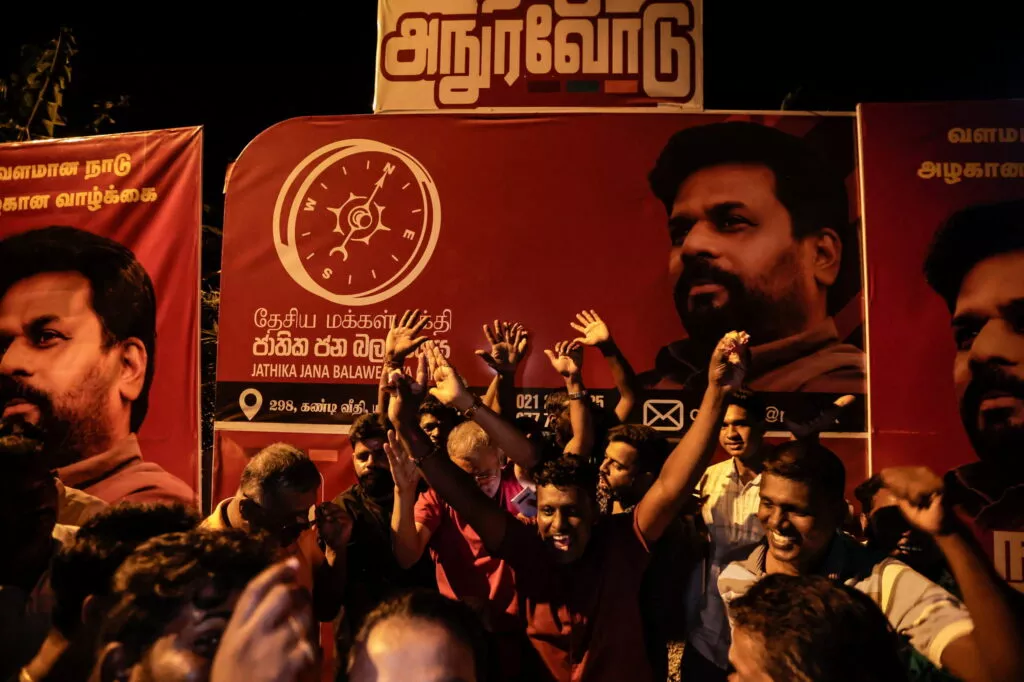Socialism with Sri Lankan characteristics
Sri Lanka experienced a significant political shift with the September 2024 election of President Anura Kumara Dissanayake of the Janatha Vimukthi Peramuna (JVP) party, marking a break from the country’s political establishment. Despite the JVP’s historic communist ties, the government is looking to strengthen democratic checks and establish pro-business policies to address the country’s looming debt payments in 2027 and to promote long-term economic growth. Along with its economic challenges, the government will also need to navigate geopolitical relations with India, China and the West, while managing ethnic politics at home.
In the short run, the effects of what came to be known in Sri Lanka as the aragalaya (struggle) people power movement were far from revolutionary: Ranil Wickremesinghe, an establishment politician close to the Rajapaksas, was installed as the president via parliament. Though lacking a popular mandate, Wickremesinghe did the important work of negotiating a painful fiscal adjustment program, striking deals to stave off Sri Lanka’s complex band of debtors and securing an IMF assistance package.
Sri Lanka’s economy has returned to positive growth. But the combined effects of the economic crisis and the austerity measures introduced in response to the crisis paved the way for a major political realignment with the September 2024 election victory of President Anura Kumara Dissanayake (referred to in the Sri Lankan press by his initials AKD) of the Janatha Vimukthi Peramuna (JVP) party. This was followed by a landslide victory for a JVP-led National People’s Power (NPP) coalition of leftist parties in the November 2024 parliamentary polls.
The rise to power of AKD marked a decisive break with the political establishment’s domination of Sri Lankan politics — it also appeared to mark a rare breakthrough for left-wing parties in Asia more generally. On paper at least, Sri Lanka now joins Nepal in being only the second country in Asia to have elected an avowedly Marxist party to national government.
But as Neil DeVotta observes in East Asia Forum, the JVP’s path to power at the head of the NPP coalition of left-leaning parties involved a process of moderation to reposition it as anti-establishment but non-threatening. Memories of its responsibility for terrorist attacks in decades past had long been an ‘electoral albatross’, DeVotta writes, ‘but creating the NPP alliance with twenty other groups helped to transform the JVP into a more conventional left-leaning party’.
Despite the JVP’s historic ties to communist dictatorships from Cuba to North Korea, the government it leads is promising to write a new constitution that will strengthen democratic checks and balances, in particular shrinking the role of the presidency. Some are hopeful that the unprecedentedly broad ethnic coalition that supported the NPP and JVP in 2024 — including Tamils and Muslims — might offer a chance for Sri Lanka to move beyond the ethnic politics that have divided society ever since independence, but time will tell whether the apparent weakening of ethnic-based voting is a mere crisis-era flash in the pan.
The economic policy remedies embraced by the JVP have been anything but radical. The president is now spruiking his pro-business credentials. Such pragmatism will come in handy in addressing the risks to long-term economic progress, as Ganeshan Wignaraja writes in this week’s lead article, continuing our Year in Review series on the major economic and political trends of the year.
While the immediate economic outlook is positive, ‘there are risks that the new government will need to tackle head-on’, Wignaraja writes. With the threat of payments of principal on the government’s debt looming in 2027, the new government ‘will need a comprehensive growth plan that addresses both immediate risks and long-term opportunities’.
One crucial issue ‘is the outflow of skilled professionals’ overseas, Wignaraja warns. Without creating the middle-class economic opportunity that will keep them at home, ‘[t]he country faces an ever-shrinking talent pool — talent which is desperately needed to propel growth’.
Sri Lanka’s balancing of relations between India, China and the West — often using its strategic location as a leverage point — has historically characterised its foreign policy and is likely to continue under the NPP. The fragility of the economic recovery means the government isn’t in a position to let ideology get in the way of investment, aid and debt relief.
Though the JVP has traditionally been seen as a staunchly anti-Indian voice on the Sri Lankan political scene, AKD’s recent visit to India capped a steady process of the party’s shedding that stance in favour of pragmatic bridge-building with India, a major creditor and prospective source of investment and diplomatic patronage. India may rightly worry about being outgunned in this regard by China, whose large investment footprint and holdings of Sri Lankan debt have fuelled an exaggerated narrative about ‘debt trap diplomacy’.
Even a relative political outsider like AKD understands that Sri Lanka’s national interests lie perched on a geopolitical tightrope, and so far he appears to be walking it carefully. International stakeholders will need to display similar pragmatism.
China, India and a Western-dominated IMF are all interested in maintaining goodwill in Colombo. There are humanitarian as well as geopolitical reasons to make accommodations to the new political leadership so that investment-boosting reforms and fiscal repair can be accompanied by the essential public spending. Increased spending on health, targeted anti-poverty measures, infrastructure and education are necessary for a recovery in Sri Lankans’ living standards.
The EAF Editorial Board is located in the Crawford School of Public Policy, College of Law, Policy and Governance, The Australian National University.

